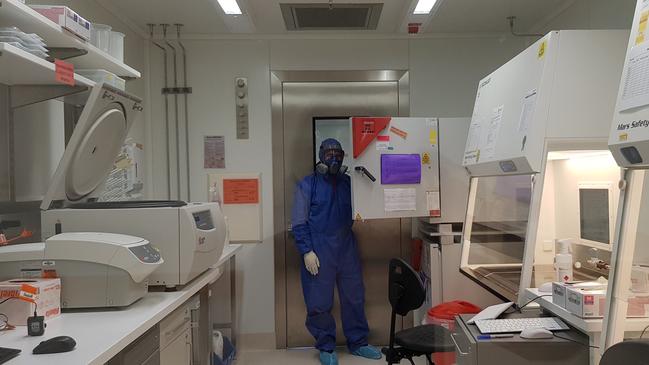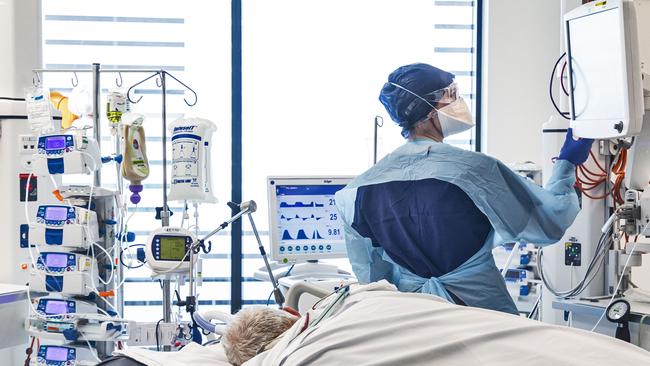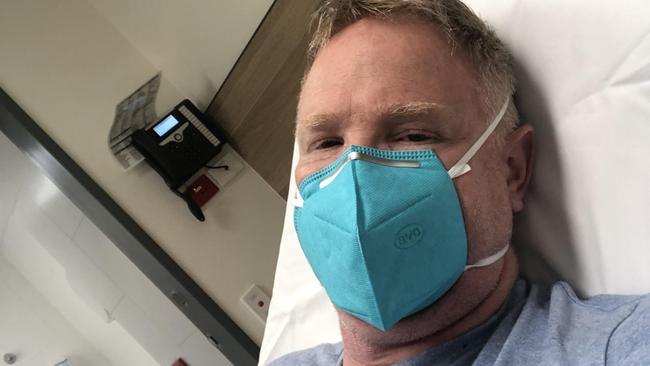Breakthrough research uncovers long Covid trigger, gives sufferers hope of treatment
Australian researchers have linked long Covid symptoms to a handful of ‘biomarkers’ in a crucial step towards developing treatments.
NSW
Don't miss out on the headlines from NSW. Followed categories will be added to My News.
A new Australian study has given hope of breakthrough treatments for those suffering from “long Covid” by linking its development to an overactive immune response.
The research by UNSW’s Kirby Institute and St Vincent’s Hospital found unvaccinated people with long Covid had a sustained inflammatory response for at least eight months following their infection.
Long Covid sufferers complain of persistent symptoms such as tiredness, difficulty breathing, cough, chest pain, brain fog and depression and anxiety for months.
However, until now, specific biomarkers for long Covid sufferers had not been identified, leading to doubt about the condition.

Co-lead author Dr Chansavath Phetsouphanh said the study, published in Nature Immunology on Friday, suggests long Covid triggers a very different immune response to other infections.
“We found that there is a significant and sustained inflammation that indicates prolonged
activation of the immune system response detectable for at least eight months following initial infection,” he said.
“Our findings may validate some of the symptoms that people with long Covid experience.”
Researchers examined blood samples from those with and without long Covid-19 for specific immune biomarkers and found those with the illness had unusually high levels of particular proteins.
“We found persistently elevated levels of Type I and Type III interferons – types of protein that cells make in response to the presence of a virus,” Dr Phetsouphanh said.
“These interferons generally disappear after an infection clears, but in patients with long Covid we found they were present for an extended period.”

The researchers analysed 29 different biomarkers to narrow down a handful associated with long Covid.
“As immunologists we’re almost like detectives at a crime scene. We have thousands of potential biomarkers – or leads – to investigate, but only a handful of them will reveal something useful,” said Dr Phetsouphanh.
Interestingly, the study found this overactive immune response occurred even in those whose initial infection was mild or moderate.
“One of the most surprising aspects of our analysis is that people don’t need to have had severe Covid to experience these ongoing immunological changes,” he said.
The researchers are still trying to determine whether different variants like Omicron cause the same changes or what role vaccination may play in reducing the risk of developing long Covid.
“From some early international data, we are very hopeful that with a milder variant and with high vaccination rates we may see less long Covid, but we will need further immunological data before we can say this for certain,” co-author Dr David Darley said.
The finding could lead to the development of breakthrough treatments by targeting the specific immune response behind the disease.
“Excitingly, by looking at subsets of cells within the immune system we found the possible
site of production of these biomarkers, which could be crucial for developing treatments,” he said.

Simon Sturm, 50, caught Covid while unvaccinated in June 2021 and has been suffering from brain fog, dizziness and memory issues ever since.
“My brain never switched back on. My memory is still no good and I forget everything, I lose words,” he said.
“I also smell things that are not there. Unfortunately, they’re not good smells. I smell cigarettes and I have a headache all the time.”

The building manager now needs help to perform simple tasks like maths calculations that he once excelled at.
“I can’t do simple arithmetic and I need help to read emails and write reports and things,” he said.
He hopes the study will not only validate the biological triggers for the disease, but lead to the development of new treatments.
“I hope that the study will prove to people that this is real. And if there was a pill for something I could take now and get my brain function back, there isn’t any money in the world I wouldn’t pay,” he said.
Got a news tip? Email weekendtele@news.com.au




